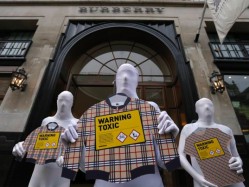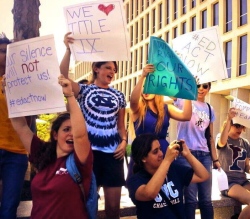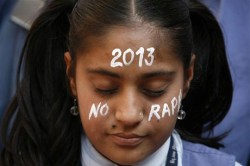Sooo (drum roll please) it’s officially time for the list of 2013’s (and a bit of January) fiercest figures, and just in time for the Lunar New Year (we’re going global girlfriends)! And trust, this past year really brought it with the incredible people and movements who didn’t just encompass fierceness, but defined it. As I mentioned in my 2012 round-up, fierceness to me is all about those “who challenge the norm, go against the grain, and beat to their own drum. It’s standing up for what you believe in, thinking outside the box, and fighting for equality and social justice.” Needless to say it was a little difficult to pick who would appear on this much coveted (at least by me) list, but somehow, I managed to get over my Libra indecisiveness and get. it. done. So, let’s do this.
Fashion:

Bangladesh workers and United Students against Sweatshops in solidarity (photo courtesy of USAS.org).
Accord on Building and Fire Safety in Bangladesh: 2012 was by all accounts a pretty depressing year for fashion, but in April 2013 the horrifying images of the Rana Plaza factory collapse in Savar, Bangladesh seemed to finally shock the world out of its acquiescence. Over 100 apparel corporations from nineteen countries in Europe, North America, Asia and Australia (including H&M, C&A, Zara, Primark and Tesco) signed the unprecedented, legally binding agreement brokered by non-profit advocacy organizations The International Labor Rights Forum and Worker’s Rights Consortium – in solidarity with Bangladesh workers – that required retailers to fund independent safety inspections of their facilities and give workers a voice to negotiate on working conditions and higher wages. United Students against Sweatshops, a college student activist group that knows how to keep shit real, have so far successfully pressured NYU, Temple, Duke, and University of Pennsylvania to stop doing business with companies that produce clothing in sweatshops and refuse to sign the Accord. They also demanded that the four largest retailers that produce college-logo apparel – Fruit of the Loom, Knight’s Apparel, Adidas, and Top of the World – sign as well. And guess what? They. did. Can we talk?? There’s still plenty of work that needs to be done, as North American companies such as Wal-Mart (ugh, go away already), Gap (your swing dance ads were cute, your constant abuse of child labor? Not so much. Oh and congrats on winning the Public Eye award for the worst human rights and environmental violations. You rock like that), Target, Disney and Children’s Place have refused to sign and offer victims compensation, even pressuring US lawmakers to cut a provision in a bill that would have promoted better labor standards in Bangladesh. Still, with European retailers signing on and charges being brought against factory owners and government figures, it’s clear that an industry that has always had a tendency to displace accountability is starting to change. Mad props to the mainstream media for keeping not just Bangladesh in the headlines, but for also covering the garment industries in countries like Cambodia, Haiti, and India. And the NPR series that detailed the global industry involved in making one t-shirt? Fab.

The Model Alliance, a labor group for fashion models, passed an unprecedented labor law in NY for child models (photo courtesy of modelalliance.org)
New law protects rights for underage models: The Model Alliance, a labor organization founded in early 2012 for fashion models working in the American fashion industry, decided they needed to do something to protect young models from exploitation. So they lobbied Governor Andrew Cuomo to sign a bill guaranteeing underage models the same rights and protections in New York State as other child performers, including regulation of work hours and wage oversight. Susan Scafidi, the academic director of the Fashion Law Institute at Fordham University, argued that it was one of the biggest developments in a century in terms of fashion and labor law, “bringing a whole new group under labor protection.” Talk about getting it done.

Did you get the memo Burberry? Toxic is SO last season! (photo courtesy of Ecouterre).
Environmental Exposes: Last year Greenpeace made this list for writing a report that revealed the toxins in our clothes, sparking a global protest movement that effectively led to twelve global fashion leaders like Nike, H&M and Zara to commit to the elimination of hazardous chemicals released into our clothes and water. Yeah GP, you do that. This year they released another report; that “hazardous, potentially hormone disrupting chemicals” were found in numerous children’s brands, from Burberry to Adidas to Disney. After some fierce social media campaigning and live demonstrations, Burberry committed to toxic-free clothing by 2020. While many of these deadlines seem far away (this article breaks down why and how change can come sooner) it’s clear that transparency in the fashion industry is starting to be taken seriously, and why shouldn’t it be? We only come in direct physical contact with textiles for 99% of our lives! Want to get involved? Check out Greenpeace’s Detox campaign and sign their manifesto. Toxic is so last season.

Carmen Carrera, a transgender model, is auditioning to be a Victoria’s Secret Angel. You go girlfriend! (photo courtesy of Getty Images).
Carmen Carrera/Elliot Sailors/Casey Legler: All three of these women defied heteronormative views of beauty this past year, with Sailors (a former swimsuit model) and Legler (an artist and athlete) working as male models and transgender model Carmen Carrera making headlines for her campaign to be the next Victoria’s Secret Angel. But as Casey Legler wrote in this fantastic essay, to focus this conversation in a sensationalist way on gender would be not just limiting and potentially harmful to marginalized communities, but would also be ignoring a historical tradition (as this amazing photography series of the ‘modern dandy’ demonstrates) of others who have come before her. As she put it, “This is not just about gender. It is about being fierce.” Isn’t everything about being fierce? Seriously though, love. them.
A$AP Rocky: Trust. Believe it or not, his collaboration with designer Jeremy Scott has helped to challenge gender boundaries in hip hop in a way that no other rapper has done before. Respect.
Bethann Hardison: Fashion model legend Hardison of The Diversity Coalition didn’t just write an open letter to the governing fashion bodies of the major fashion cities blasting the industry for its “white-washed model casts,” she also called out the designers who were the worst offenders, sparking a larger conversation about racism on the runways. But as Naomi Campbell put it when she threw it down (as only Naomi knows how) with this interviewer, change isn’t going to happen by pointing fingers. It needs to be systemic. Although the fall shows did include more models of color, there still needs to be a push for what Hardison notes is a failure to commit to consistent change. And that, as scholar Minh-Ha T. Pham wrote in this essay, might take completely restructuring the industry’s dynamics of “race, power, and profit.” It probably won’t happen overnight, but at least the conversation has started, right?
Christian Vs. Barney’s New York: After being arrested by Barney’s for daring to buy a couture belt, nineteen year old student Trayon Christian sued the luxury retailer for racial profiling and false arrest. The media coverage inspired others, including Rob Brown of HBO’s Treme, to reveal their own personal stories of being profiled and arrested by retailers ranging from Barneys New York to Macy’s for what some labeled as simply ‘shopping while black,’ challenging the notion that we live in a post-racial world. And when Jay-Z failed to show solidarity by refusing to cancel his collaboration with Barney’s, the ensuing outrage added another level of complexity to the debate.

The Paul Frank/Native designer collab featured this gorgeous necklace by Autumn Gomez of The Soft Musuem (photo courtesy of cnn.com).
Native Artisan/Paul Frank collaboration: I’ve written before how the fashion industry has a history of treating Native people like trends, and the ‘Pow-Wow’ party that designer Paul Frank threw for Fashion’s Night Out was a great example of that. But then, something really rad happened. Paul Frank’s team didn’t just apologize after the ensuing backlash, they expressed interest in developing a capsule collection with Native designers and donating the proceeds to a Native cause! Love me some self-reflection. I mean seriously, how many people in positions of privilege are willing to clock their own T? The amazing ladies of Beyond Buckskin and Native Appropriations, Jessica Metcalfe and Adrienne Keene, respectively, helped to launch this collection, which featured pieces by four amazing designers. And when Paul Frank failed to mention in his press releases the reasons for why this collaboration came about in the first place, Adrienne took to her blog to remind everyone that “remembering the origins reminds us of the inherent power structures in society (and therefore the fashion industry) and that it took hundreds of angry voices.” It is these voices that influenced not just the Frank collection but also brought greater visibility to the issue of cultural appropriation in the fashion industry, demonstrating how the power of the blogosphere coupled with community activism can actually spark social change, when it’s done right (I’m looking at you ‘Invisible Children/Kony 2012’).

Bob Bland of Manufacture NY, which will provide production facilities to local designers (photo courtesy of Ecouterre).
Designers bring back local production: The New York manufacturing industry alone has seen a 90 percent decrease in jobs since the early 1900s. That’s pretty depressing. Which is why it’s so refreshing that designers like Bob Bland, Kelly Jones and Dana Arbib are providing facilities and support in the U.S. for upcoming independent designers who need help getting started in an industry that can be tough to break through. Mad props to these chicas for encouraging local production and consumer transparency. Mad. props.
Fierce People/movements who challenged gender/sexuality ‘norms’:

Students protest outside of the Department of Education, demanding better Title IX enforcement (photo courtesy of Feministing).
The Global Movement to end sexual violence: There have always been people and movements that have worked on fighting sexual violence, but 2013 was the year that witnessed a true shift in cultural consciousness, becoming blatantly clear that ignoring or brushing aside sexual assault was no longer an option. In the United States, a coalition of hundreds of sexual assault survivors, advocates and allies came together through the ‘IX Network’ to combat campus rape culture, with its mission being to “support all survivors, to change how colleges and universities handle sexual assault, and to change a culture where violence is normalized.” Federal complaints were filed nationwide against universities that had a history of treating sexual misconduct as a less egregious crime than plagiarism, allowing, for example, serial predators back on campus after they had written book reports and purposefully under-reporting the number of sexual assault cases that had occurred in a year. The blogosphere (which has arguably transformed the feminist conversation) expectedly kept up with these stories, but surprisingly so did the mainstream media, forcing this long ignored injustice into the public sphere. And then, there was the outrage over the rape in Steubenville, sparking broader debate about cultural misogyny, rape culture, media framing of sexual violence, and even trigger warnings.

A young woman protests sexual violence after the gang rape in Delhi, India (photo courtesy of usilive.org).
These conversations were connected globally after the brutal gang rape of a student from Delhi, India. Even Bollywood actress Mallika Sherawat made her voice heard, giving a fiery press conference on the rights of women in her country that was pretty much the fiercest. thing. ever. And of course, who can forget the massive online campaign forcing Facebook to revisit their policies on misogynist hate speech? Changing how our culture treats sexual assault and violence is going to take a lot of work, but I’m hopeful that survivor activist Angie Epifano is right when she said, “I think people will look back in 20 or 30 years and say, ‘This is when things started to improve.'”
Edith Windsor: Her Supreme Court win striking DOMA down guaranteed rights to an entire group of people. That pretty much redefines fierce.
Malala Yousafzai: Why is 16 year old Malala on this list? Um, let’s see. Girls education advocate. Survived an attack by the Taliban, and then went on to write a book about it. Oh, and get nominated for a Nobel Peace prize. Whateves. I do that like every day. Not to mention she basically told President Obama drone attacks were fueling terrorism and killing innocent people in Pakistan. As she put it in her book I Am Malala, “We realize the importance of our voices only when we are silenced.” Now that’s a guiding post quote for every activist! Check out this interview with Jon Stewart, whose mouth literally drops as Malala expresses her belief that the best way to fight those who are trying to oppress you is not with cruelty, but with dialogue, education, and peace.
Roya Mahboob and Ory Okollah: I’ve written before about how peeps in the West tend to take technology for granted, while those who live in countries where technology is less accessible often use new media as a powerful tool for change. Mahbook and Okollah are no exception, as they are both using the blogosphere to give women a platform in their countries of Afghanistan and Kenya respectively. Their hope is that by encouraging these young women to connect with each other and make their voices heard, they will feel empowered to transform their communities and push countries forward. As Okollah put it, “We talk about African governments like they’ve been dropped from Mars, you know? They come from us.” Truth.

Ory Okolloh didn’t just “put Kenya on the map as a tech innovation hub,” she’s using her position to empower future female leaders of Africa (photo courtesy of good.is).
Uruguay: Defying stereotypes, Uruguay passed a bill in favor of marriage equality, adding to Latin America’s reputation as a region that values gay and trans rights as human rights and is more progressive in that sense than the U.S. and many Western European nations (they’ve also edged ahead of the U.S. in women’s political leadership). But because they’re ‘third-world’ they’re totes backwards right? Hmm….
Charlotte Laws: After computer hackers from the revenge porn site ‘Is Anyone Up?’ stole pictures of her daughter, Lawson waged a ‘war’ against revenge porn creep Hunter Moore, successfully helping to both pass anti-revenge porn legislation in the state of California and launch a FBI investigation that led to his arrest. Guess even Moore couldn’t deal with a bad ass mama taking on the misogynist internet.
Sarah Slamen and Wendy Davis: After Wendy Davis pulled a marathon filibuster to stop a restrictive anti-abortion measure in Texas, Sarah Slamen testified at a state Senate committee and was thrown out by troopers after she called out Texas’s hypocrisy in upholding the death penalty and refusing to teach sex education in schools. The Texas legislature received widespread criticism over the stifling of citizen speech, and her powerful statement of “Excuse me, this is my government, ma’am. I will judge you,” was reblogged and tweeted like crazy. Talk about shutting. it. DOWN.
The Selfie: Ok, so I know a lot of people groaned when ‘the selfie’ was picked as the word of the year by the Oxford Dictionary, claiming that young teen millennials (specifically girls), had reached a narcissistic, desperate low. But I loved this article that argued for a smarter conversation than always viewing young women as passive victims (imagine that!) and not as agents of their own lives. As this blogger put it,
“The act of women taking selfies is inherently feminist, especially in a society that tries so hard to tell women that our bodies are projects to be worked on and a society that profits off of the insecurities that it perpetuates. Selfies are like a ‘fuck you’ to all of that, they declare that ‘hey I look awesome today and I want to share that with everyone’ and that’s pretty revolutionary.”

Beyonce isn’t just a feminist, she’s a ‘fierce’ feminist. Which is the best kind there is, right GFs?
Feminism became cool again: Any movement promoting equality should automatically get respect, but feminism has often suffered from political (thanks Limbaugh), social, and media backlash that has resorted to sensationalist depictions of feminists as ‘bra-burners’ (which never actually happened btw) or worse. In past years we’ve heard from singers like Katy Perry and Kelly Clarkson who have resisted the feminist label, which is why it was so refreshing to see so many embrace it this past year. There was Beyoncé mentioning author Chimamanda Ngozi Adichie’s Ted talk “We should all be Feminists” as an inspiration for her video series on imperfection accompanying her latest album. Sixteen year old music sensation Lorde openly spoke about her feminism, not backing down when Selena Gomez fans attacked her for criticizing the pop singer’s sexist lyrics. John Legend, after performing at a charity event for Chime for Change, stated his opinion that “All men should be feminists. If men care about women’s rights, the world would be a better place.” Can I get a PREACH?! Even Miley Cyrus claimed in an interview “I feel like I’m one of the biggest feminists in the world cause I tell women not to be scared of anything” (yes Miley, I was totes afraid of twerking until you ‘introduced’ it to us…thank you for showing me the light!). Amy Poehler and Ellen Paige also weighed in, questioning in interviews why some celebrities balked at the term. As Amy Poehler put it, “That’s like someone being like, ‘I don’t really believe in cars, but I drive one every day and I love that it gets me places and makes life so much easier and faster and I don’t know what I would do without it.'” True. dat.
#solidarityisforwhitewomen: This hashtag went viral, reminding us that while feminism is dope, it needs to be intersectional to really work.
Subjectified and Do Tell: Melissa Tapper Goldman’s documentary and the blog project that came out of it offers authentic, uncensored personal stories about women’s sexuality that we too often ignore in a society that is in turn both sex-saturated and silencing of honest (sexual) experiences. Thank you girlfriend.
Evan Rachel Wood: Speaking. of. that. This statement by actress Evan Rachel Wood. Omg. THIS.
Laverne Cox: One of the stars of the new series “Orange is the New Black,” Cox has become a transgender icon and activist who with co-guest Carmen Carrera schooled (in the most gracious way eva) Katie Couric for expressing a fixation with gender reassignment surgery. As she put it:
“The preoccupation with transition and surgery objectifies trans people. And then we don’t get to really deal with the real lived experiences. The reality of trans people’s lives is that so often we are targets of violence. We experience discrimination disproportionately to the rest of the community. Our unemployment rate is twice the national average; if you are a trans person of color, that rate is four times the national average. The homicide rate is highest among trans women. If we focus on transition, we don’t actually get to talk about those things.”
Germany offers third gender option: Every year, there are children who are born of indeterminate gender. Instead of parents being forced to choose their gender identity for them, Germany has given a third option on birth certificates so parents can leave it up to their child to decide whether to identity as male, female, or neither. Heyy Germany, we see you!
Tina Fey and Amy Poehler host the Golden Globes: Sarah Silverman is probably right that making a big deal about women in comedy is a little passe, but Tina and Amy rocked it in both 2013 and 2014 and proved themselves to be two of the best hosts of any award show eva. I mean seriously, this video deserves to be on this list for that Leo DiCaprio dig alone (you know you loved it).
Media and Culture
FCC ditches media mergers: This was SO huge. I’ve written before about how an increasingly corporatized media landscape that puts the vast majority of media into the hands of the few is challenging our democracy. So it was pretty depressing when the FCC announced they were considering changing the one rule that was preventing Rupert Murdoch from buying out pretty much every media outlet. But hundreds of thousands of peeps took action and stopped Murdoch in his tracks in a citizen protest that was pretty much epic. Love.
Occupy’s Legacy: Speaking of citizen protests, whether or not the members of the movement are still camped outside of Zuccoti Park in New York is irrelevant. Their economic framing of the 1% vs. the 99% has resonated with the American public, completely changing the conversation at home, in workplaces, newsrooms, and the political sphere. Language matters. And by reframing the discourse on inequality, they also broadened the conversation beyond just Wall Street and economics.
Comics take on racism/privilege: Speaking of that. Did anyone else get this sense that American media and culture was discussing privilege and racism in a way that we’ve typically been reluctant to do? Whether we were debating the outcomes of the Trayvon Martin trial, the ‘Affluenza’ defense used to excuse a wealthy teenager’s crimes, and the data revealing that African-Americans are far more likely to be singled out for drug arrests and random frisks, it was clear that Americans were finally starting to acknowledge that we hardly live in a post-racial world. Going through all the media coverage would be a bit much (I mean, this post needs to end at some point, right?), so I’ll highlight three comedy routines that really captured our current cultural moment. This ‘Key & Peele’ sketch on the hoodie, this Louis CK routine that perfectly explains the historical context of racism, and this routine by stand-up comedian Aamer Rahmen where he covers issues like inequality, colonization, slavery, war, and internalized racism as a way to break down why the idea of ‘reverse racism’ doesn’t work. In like, three minutes. You do that.
Edward Snowden: You know how he do. Exposed the massive surveillance program conducted by the U.S. government. Sparked a national privacy debate. Raised questions on the constitutionality of the program that might rein in the ability of the executive branch to conduct surveillance. From an ideological position, whether I’m condoning or condemning him is not the issue. The issue is whether he meets this blog’s definition of fierceness, and based on that I think to not include him on this list would be a straight up act of treason (oh no. I. didn’t. Oh yes I did! Snap!)
Colbert’s report on Mayor Johnny Cummings: This profile on Vicco, Kentucky, the smallest town in the nation to pass a non-discrimination ordinance that included sexual orientation, was hilarious and a wonderful turn on Appalachian stereotypes. And I might have cried just a little bit (shhh…don’t tell).
Antoinette Tuff: The stunning 911 tape of bookkeeper Tuff, who worked at an elementary school in Georgia, talking a gunman into surrendering to police went viral because of the compelling way she used empathy and compassion to connect with a mentally ill man who was in despair. Tuff not only shared her own stories of her struggles and attempted suicide during the call, she even told the young man that she loved him. Her story is a testament to how, as scholar bell hooks put it in her piece “Love as the Practice of Freedom,” the “moment we choose to love, we begin to move towards freedom, to act in ways that liberate ourselves and others.” Amen. And on a related note…
bell hooks and Melissa Harris Perry OMG: Did these two really just sit down and cover politics, race, black womanhood, media, and love in one conversation? And was it even more brilliant, honest and critical an analysis than I expected it to be? Yes, they did, and yes, it was.
Misee Harris – the first Black Bachelorette: So you don’t think a reality television show has a place on this list huh? Why don’t you read this post and get back to me. You back yet? Ok chill, now that we’re on the same page (obvi), I think we can agree that starting your own campaign as a response to the racial exclusion of minorities on a popular television show and forcing a conversation about racism into the national spotlight is pretty. damn. fierce. The pediatric dentist/model/philanthropist is still in the spotlight, and has recently patented her own line of athletic mouthguards, advanced in casting for the show Shark Tank, and is also working on her own reality show that will present black women beyond the simple caricatures that are too often on our TV screens (I’m looking at you Atlanta Housewives) Love. her.
Music/Theater/Dance:
Broadway makes history: The Tony Awards in 2013 were pretty epic. Four African American actors won awards, with 88 year old Cecily Tyson making history as the oldest person to win a Tony for a role that wasn’t originally written for a black woman. Not only that, but the two directing awards both went to women, including my girl Cyndi Lauper. Sure sometimes girls just wanna have fun, but sometimes they wanna win awards and make history too.
Pussy Riot/Riot Grrrls: This punk rock band from Russia makes the list again, for clocking the T on the Kremlin when they accused them of pulling a ‘publicity stunt’ for finally releasing them from jail…right before the Winter Olympics. Also, shout out to fellow riot grrrl bands The Shondes and Kathleen Hanna (the queen mother of all riot grrrls) and her band The Julie Ruin for their fierce new albums. Oh and we can’t talk about punk and not mention Rupaul, who spoke so much truth in a recent interview with Rolling Stone when he said, “Doing drag in a male-dominated society is an act of treason. It’s literally the most punk rock thing you can do.” And we’re done GFs, DONE.
Janelle Monae: We all know Monae’s music is off the hook (I mean her song Q.U.E.E.N. with Erykah Badu??), but it was her interview below that really gave me life. It’s here that you get insight into Ms. Monae’s true philosophy and vision. I loved when she talked about her ‘androids of the future,’ which she envisions as “the new woman, the new minority, the new gay” who are “deeply connected and committed to community.” I. die.
Prancing Elites: A few months ago, one of my homegirls sent me the video below as a congrats when I met a big deadline. An hour later, I still couldn’t get enough of this gender-bending dance troupe from Mobile, Alabama. Dancing in the ‘J-Setting’ style, which was popularized by the Beyoncé video, “Single Ladies,” the fearless group members have been celebrated by their hometown and even on the show ‘The Real’ in Los Angeles. So happy they met their Kickstarter…can’t wait to see them werk it out in 2014!
Six year old B-girl Terra: This girl is SO dope. And Badass. And fierce. And yes, I’m inspired by and look up to a six-year-old. Suck it. Be sure to check out her Facebook page!
Becky G: Much like Kitty Pryde, Mexican-American teenager and rapper/singer Becky G gained recognition when she posted remixes of songs on YouTube. Her song “Becky from the Block” was released in 2013, and the video features a shout-out to her Latin culture and plenty of bravado as she raps, “Right now its just who is that girl? But one day Imma be all around the world.” This. Girl.
Valerie June: I’ve always loved peeps who can’t be put into a box, and I think after watching this teaser of her upcoming album you’ll agree that pigeonholing this Tennessee blues/country/folk/gospel singer would be pretty much impossible. Obsessed.
Qaadir Howard: Speaking of out of the box. Qaadir (aka Timaya) certainly isn’t new to the Youtube game – he’s been putting out videos since 2007. But I’ve been pretty much addicted to his channel since he kept it real in 2013 with this video about the shady politics of YouTube. He serves a little bit of everything – music, sketches, inspirational videos, and really, really hilarious rants. It literally hurts me to pick just a few of my favorite videos, but I would def check out “The Wal Mart Terrorist,” “Get off My Phone Sanjay Gupta,” (Sanjaaaaay!!! LOL), his sketches on Nicki Minaj and “Gary Mars The Space Alien, his beautifully spiritual and humanist video “I Was Homeless For a Night,” and when actress Tracee Ellis Ross hilariously bombed him in her own video. I also love me some inspirational Qaadir, like his videos on “Making Lasting Change” and the one posted below. Thank you Q, for always keeping it real and teaching us all how to “clock the T where it needs to be clocked!”
Can’t wait to see what this next year brings us! Does anyone else get this intense vibe that 2014 is going to be the year? For all of my girlfriends who have joined in the conversation and shared links with me on Facebook and Twitter, thank you. You have really enriched my knowledge of the world and I’m so grateful to all of you. Here’s to the fiercest. year. EVER!
And let me know in the comments below if there’s anyone else who should have been added to the list – I’d love to hear from you!
My Related Posts:
2012: The Year’s Fiercest Cultural Figures

















